Face masks: The ultimate guide to coverings as England's rules change on Friday
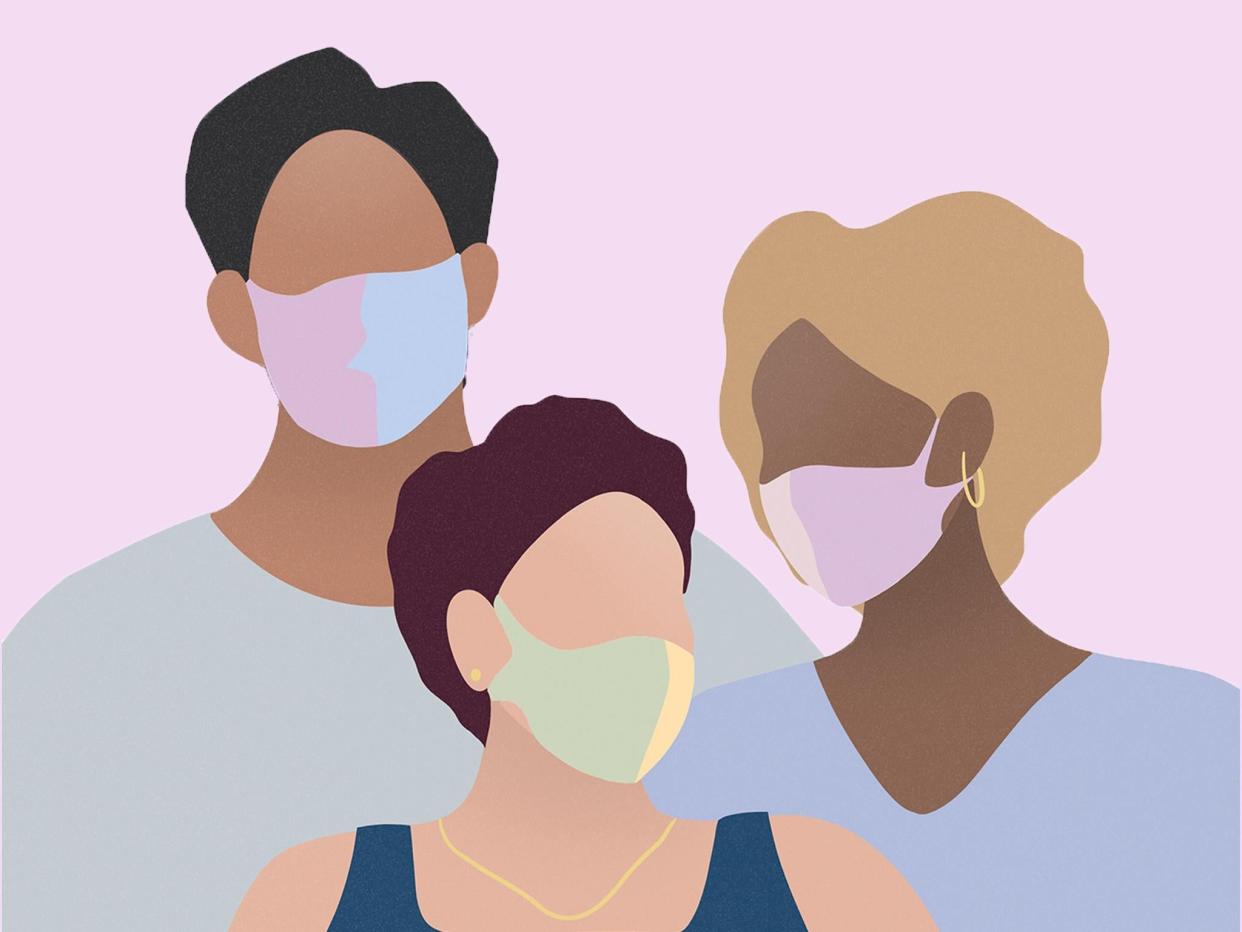
The coronavirus pandemic has meant that face masks and coverings will become part of daily life. The UK government and the World Health Organisation (WHO) have both advised wearing face coverings in a bid to reduce the infection transmission of Covid-19.
It was recently announced that from 24 July, face coverings will be mandatory in all shops and supermarkets in England. People who don't wear one will face a fine of up to £100, apart from people with medical conditions and children under 11.
If you're picking up a takeaway coffee or food in England, you'll also have to wear a mask, but this rule doesn't apply to sit-in meals. The Northern Ireland secretary, Brandon Lewis, confirmed: “If you’re going in to buy a takeaway, and leaving again, you’re treating it like a shop - and you should be wearing a face mask.”
On 14 July health secretary, Matt Hancock, said: “We want to give people more confidence to shop safely and enhance protections for those who work in shops," while noting the disproportionate impact that the pandemic has had on shop workers.
"The death rate of sales and retail assistants is 75 per cent higher amongst men and 60 per cent higher amongst women than in the general population,” he added.
Since 15 June, it has been mandatory in England to wear them when travelling by train, Tube, bus, ferry or plane.
Sir Venki Ramakrishnan, president of the UK's national science academy said on 7 July that everyone should carry a face covering when they leave home. "Not wearing a face covering should be regarded as 'anti-social' in the same way as drink driving or failing to wear a seatbelt," he said.
From 4 July in England, pubs, restaurants, hairdressers, hotels, cinemas, museums and art galleries started to reopen, and social distancing guidance has been reduced from 2m to 1m.
The ban on people from different households meeting indoors together has also been eased, provided people stick to social distancing rules. There is no limit on how many people can gather indoors, as long as they are members of just two households at any given time.
When it comes to hospitals, all visitors and outpatients in England are advised to wear face coverings. Health staff will now wear surgical masks at all times.
Uber has also made face coverings mandatory for drivers and customers, and is taking additional safety measures such as regularly sanitising their cars. Customers will also be reminded to sit in the backseat only and to roll down the windows for ventilation.
From 10 July, it has been compulsory to wear a face covering in shops in Scotland, except for people with certain medical conditions and children under five. Since 22 June people in the country had to wear face coverings on all public transport too, including the Glasgow Subway, Edinburgh trams and taxis, with the same exemptions.
In Wales, face coverings will be mandatory on public transport from 27 July, including in taxis. The Welsh Government is also advising people to wear masks in crowded places where social distancing is not possible, but this is not compulsory. The Republic of Ireland and Northern Ireland have also imposed the same rules for public transport.
There has been continued debate over the benefits of face masks and coverings and how they, if they, work. To help make it easier, we have put together everything you need to know about them so you’re prepared and informed.
You can trust our independent round-ups. We may earn commission from some of the retailers, but we never allow this to influence selections. This revenue helps us to fund journalism across The Independent.
What to know before buying a face mask
The government has been careful to distinguish between face coverings and masks in its guidelines and has been clear that the general public should not be buying medical face masks, as these need to be reserved for frontline staff and key workers only.
Medical masks and face coverings differ in their effectiveness. Trish Greenhalgh, professor of primary care health sciences at the University of Oxford, told The Independent: “Many infections are spread by droplets, which are relatively large when they first come out as a cough or a sneeze but become much smaller as they travel through the air. The job of a cloth face covering isn’t to protect the wearer but to block the source of infection (what’s known as ‘source control’).
“The main benefit is most of your germs will be caught in it, making you less of an infection risk to others. My mask protects you; yours protects me,” she adds.
The WHO has created a series of videos and infographics to show people how to use face coverings properly. Before wearing your mask, your hands should be clean and while wearing it, you should not touch your face or adjust the mask.
Doing this can transfer virus particles from the outside to your mouth and nose. Taking your mask on and off should only be done by un-looping the straps from behind your ears and once you have removed it, store it in a clean, plastic reusable bag and wash your hands. When taking the mask out of the plastic bag, touch only the straps.
What to consider before buying a face covering
Valves: While valves are a common sight in some face coverings, avoid buying a face covering with a valve, as they do very little. Marisa Glucoft, director of infection prevention Children’s Hospital Los Angeles explained why they're ineffective: “When you wear a mask with a valve, people around you are not protected because the valve lets all of your breath into the air.”
Glasses: If you wear glasses, you should go for a tie face covering so you can adjust the fit of it so it sits tightly across your nose, or look for a mask made with a nose clip. This will limit glasses from steaming up.
Facial hair: For people with facial hair, like beards or a moustache, the Centres for Disease Control and Prevention (CDC) has warned that facial hair may interfere with the effectiveness of face masks. If you’re not willing to go clean-shaven, make sure that the hair fits inside of the mask.
Hearing difficulty: As face masks cover your mouth, it makes it difficult for deaf people and those who have hearing problems and communicate through lip-reading to know what you’re saying. It also limits understanding based on facial expressions. If you or someone you know is struggling with this, London-based charity Action on Hearing Loss has created an information card with tips for people with hearing loss and advice for the general public. Read our guide for where to buy transparent coverings for people with hearing problems.

They include: reducing background noise as much as possible, writing things down with a pen on paper or on mobiles and using simple gestures such as pointing or waving. Face coverings with clear panels are available so people can read lips and expressions more easily.
How often you’ll need to wear it: If you will be going on public transport every day, buy a pack of masks so you’re not washing just one every day to reuse. If you’re buying for your family, ensure that there is enough for everybody as masks should not be shared, in order to reduce the risk of transmission.
How it should fit: For a face mask to be effective, it must fit over the bridge of your nose, past the edges of your mouth to under the chin, without restricting your normal head movements. You should be able to breathe comfortably while wearing it.
Fabrics: You will also want a mask made in a fabric that’s soft enough to sit on your skin without any discomfort. The more uncomfortable you are, the more likely it is you will touch your face or fiddle with it.
Different types of face coverings
Face coverings can be made from things you’ve already got at home. Learn how to make your own face mask at home from a sock, T-shirt or by sewing with these easy steps.
However, face coverings can also be bought pre-made online and in shops, as retailers respond to the increasing demand.
Cotton masks – These are typically designed in either a pleated or moulded design to better fit your face, and are lightweight. To ensure you’re as protected as possible, look for cotton masks that have a built-in filter or a pocket which you can add a filter too. They’re also soft enough to be comfortable on sensitive skin.
Linen masks – As linen is not an easy environment for germs to breed, it is used by some companies for its natural antibacterial properties.
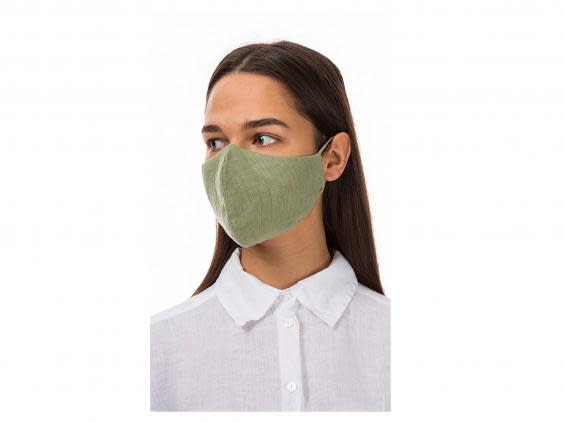
Synthetic fibres – You may find some masks made from combinations of materials, such as polypropylene (the same material used for medical masks) with a cotton lining to make them comfortable against your skin when worn for long periods of time.
Tie masks – Some masks are made with ties, rather than elastic straps. This means it is easier to secure your mask to your face shape, just ensure they are properly adjusted to avoid touching your face.
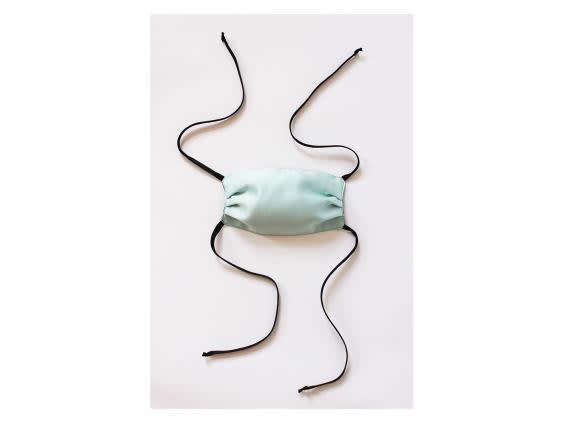
Elasticated ear loops – Many masks have elasticated ear loops to help them fit snugly behind your ears, but most elastic loops cannot be adjusted.
Filters – Some masks have built-in filters or a filter pocket for you to replace them yourself and dispose of after each use. If your mask is reusable, you will need to remove the filter before putting it in the washing machine.
Nose wires – Some masks have a built-in metal or plastic wire that sits across the bridge of your nose. This is designed to provide a snug fit and limit how much it moves when you’re wearing it.
Transparent – Face coverings with transparent panels made from clear vinyl help other people see your mouth to lip read, and are available from Etsy.
Where to buy face coverings
Since the beginning of lockdown, many businesses have pivoted their production to manufacturing face masks, along with individuals creating their own via retailers such as Etsy.
Other larger retailers who have launched cloth face masks include Mango and Asos, along with independent brands including Aeibe, Newt, Just Hype, Florence Bridge, Plumo and Wawa Clothing.
Prices range from a couple of pounds for basic styles up to £50 for higher-end masks from luxury labels. Keep in mind that due to the pandemic, deliveries may be delayed.
At Contrado, you can buy a four-pack of masks for £15 and even design your own artwork to decorate them. If you’re not feeling creative, you can also shop designs that are already made. The masks are available in small, medium, large or extra-large – so pick the size you want and you'll get four of the same in your pack.
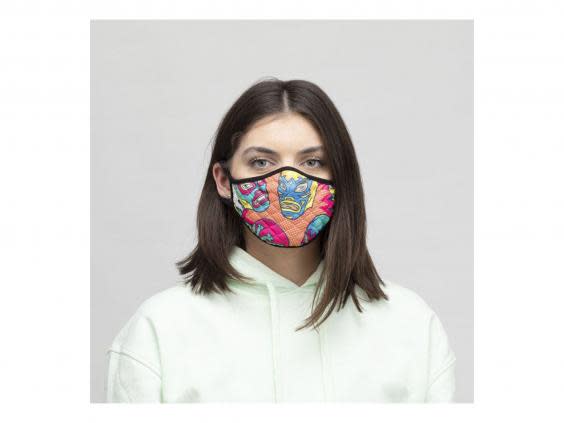
It describes the fabric of the masks as high-quality and breathable, lasting up to 100 washes, but advises not to tumble dry.
Alice Cox, a freelance theatre prop maker and set designer, started creating bespoke face masks from old designer fabrics from her spare room in Kennington, London.
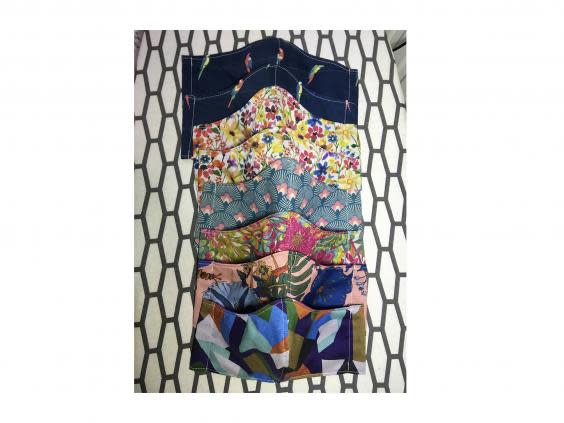
She has designed them with a pocket large enough to fit a filter and non-elastic band that will minimise irritation around your ears. To place an order, email your choice of colour and material to alicecoxcreative@gmail.com. One mask will cost you £10, unless you want the liberty-printed style, which is £15.
For £13, Good Ordering is selling reusable face covers made from two layers of 100 per cent natural fabric, with at least one layer that is densely woven for more protection and elastic straps, which also allows you to insert a filter on the inside.
They're currently sold out, but you can leave your email here to be contacted when they become available again.
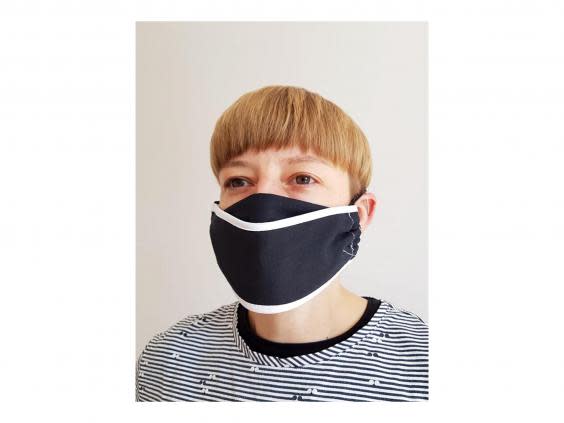
The face covers come in one size for adults, but you can request extra-large as well as children's sizes. They are also selling filters too, which you can buy here.
All the fabrics used to make the face covers are made from recycled or remnants of material in collaboration with a local costume professional, and while it washes the fabrics at a high temperature before production, Good Ordering advises to wash the product before use too.
You can find a list of other retailers to shop from in our guide on where to buy a face mask in the UK.
The face coverings to buy for children
Government guidelines have dictated that children under the age of two, and children unable to put on a mask unassisted should not wear them, but all others should.
In our guide to buying face masks for children, you’ll find a selection of retailers to shop with here.
They’re made in smaller sizes, with and without built-in filters, in soft materials with stretchy ear loops to ensure they stay secure.
You’ll find adult and kids masks available in Rachel Riley’s signature prints of flowers, gingham and more.
Each one costs £19 and they are suitable for children aged three and above, and the same designs are available for adults, so you can match if you like. They are made with a cotton satin lining, polyester inner layer and cotton outer layer.
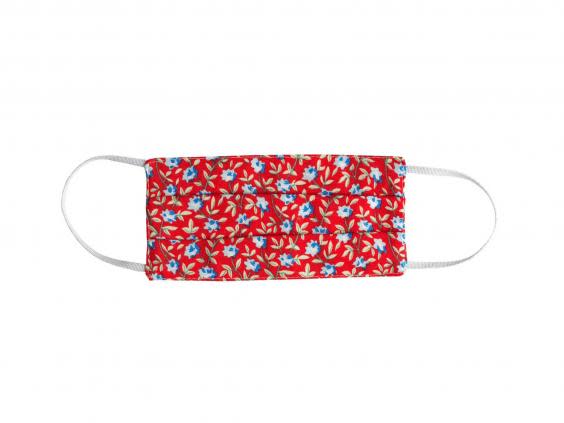
It will also be donating 10 per cent of profits from the sales of its face coverings to Best Beginnings, a UK charity that supports parents during pregnancy and the early stages of parenthood.
In a surprising turn, stationery brand Vistaprint has manufactured a range of kids and adults face masks, costing £13 each. There’s plenty of kid-friendly fabrics to choose from including colourful doodles, khaki green, baby pink, stripes, lightning bolts and hearts.
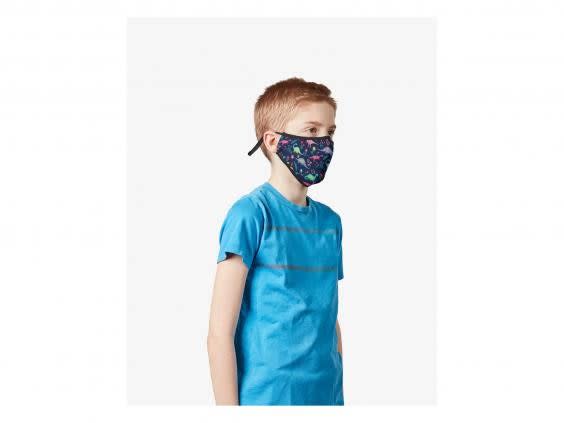
Every mask comes with a replaceable filter system that can be rewashed, a 100 per cent cotton anti-allergenic inner layer, a three-dimensional chin structure, adjustable straps and a nose bridge. For every reusable mask bought, Vistaprint is also pledging to give 10 per cent of sales to local communities impacted by the pandemic.
Founded by mother-of-three Jo Bates, Thumbsie creates fabric gloves to help children to stop sucking their thumbs, but has also started to create fabric face masks for kids in light of the pandemic.
While you can’t buy individual masks due to the high demand, you can still buy its four mask packs. The packs are available in three sizes, S, M and L, and are suitable for children between three and 16, costing £35. They are available in prints such as pirates, flamingos and superheroes.
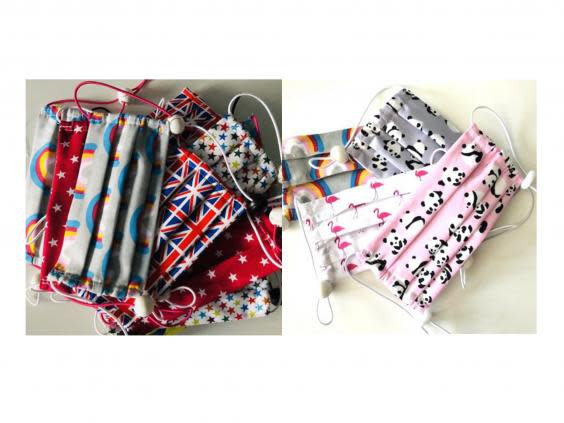
They are made from polycotton and cotton and have an inner pocket so you can insert your own filter if you wish. The elastic straps are adjustable too.
How to wash face coverings
To keep your mask as clean as possible, WHO recommends washing it once a day, using soap or detergent, with hot water.
However, most reusable fabric masks in materials like cotton and linen are machine washable, but make sure to check the label.
According to the CDC, you should use “the warmest appropriate water setting and dry items completely”. A hot wash is recommended, so 60C or higher.
If your mask comes with a filter you can remove, ensure you bin it before washing.
Read our guide on where to buy a mask in the UK, face masks for children, where to buy transparent coverings for people with hearing problems, and our face mask make-up guide
Read more
Face masks: Where to buy cloth coverings to protect yourself
Face masks: Where to buy cloth coverings as lockdown eases
Face masks: Where to buy transparent coverings
Face mask make-up guide: What you need for long wearing coverage
11 best educational websites for kids: Free online resources
How to cut your own split ends before hairdressers reopen

 Yahoo News
Yahoo News 
